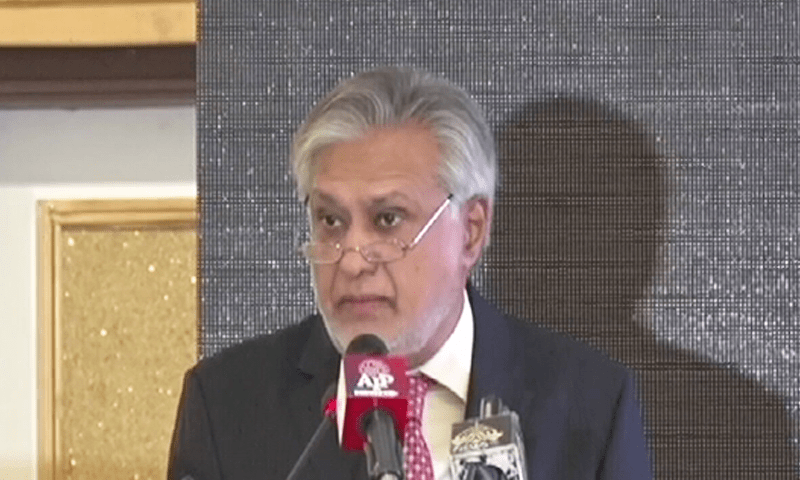Finance Minister Ishaq Dar vowed on Thursday that he and his team were “absolutely committed” to completing the current $7bn Extended Fund Facility programme with the International Monetary Fund (IMF), once again stressing that Pakistan was close to signing the staff-level agreement.
The government is in a race against time to implement measures to reach an agreement with the IMF as the country has reserves barely enough for three weeks of essential imports, while hotly contested elections are due by November.
Addressing a seminar organised by the Finance Ministry in Islamabad today, Dar said: “I and my team have decided that, in a short period of time, we will implement and we will discharge all the sovereign commitments that the previous government had made.”
He recalled that the coalition government was handed over an economy which was “in a shambles”.
“To top it [off], the previous government had agreed to a loan facility which was extended by the IMF. But instead of honouring the commitments, they reversed some conditionalities before leaving office. This led to a serious trust deficit [between the lender and Pakistan],” he highlighted.
However, the minister went on to say, the government had realised that these obligations were not made by an individual but by the sovereign state of Pakistan and decided to honour the commitments.
“We have been in the process of the 9th review which has taken longer than it should have […] we seem to be very close to signing the staff-level agreement, hopefully in the next two days,” Dar added.
The agreement with the IMF on the completion of the ninth review of a $7bn loan programme — which has been delayed since late last year over a policy framework — would not only lead to a disbursement of $1.2bn but also unlock inflows from friendly countries.
The prerequisites by the lender are aimed at ensuring Pakistan shrinks its fiscal deficit ahead of its annual budget around June.
Pakistan has already taken most of the other prior actions, which included hikes in fuel and energy tariffs, the withdrawal of subsidies in export and power sectors, and generating more revenues through new taxation in a supplementary budget.
Austerity measures
The finance minister said that Pakistan was going through a rough patch today and it was important for everyone to contribute to overcoming these challenges.
“As they say, charity begins at home and the prime minister has, therefore, announced an austerity package,” he stated and then elaborated on some of its salient features.
Prime Minister Shehbaz Sharif had last month announced a slew of what he called austerity measures. These included cabinet members forgoing their salaries, paying their own bills, banning the purchase of luxury vehicles from 2024 and slashing the current expenditure by 15 per cent, among others.
At the seminar today, Dar said that these measures had already been implemented and notified to the Finance Ministry.
Flood rehabilitation
The minister further said that Pakistan’s economic difficulties were compounded by the devastating 2022 floods, which affected 33 billion people and caused physical and economic losses of nearly $30bn.
“But despite the fiscal constraints and limitations, the federal and provincial governments have jointly allocated Rs452bn for relief and rehabilitation work of flood affectees.
“If need be, we will together provide more resources to our brothers and sisters in need,” he promised, adding that international agencies had calculated that around $16bn would be required for the reconstruction and rehabilitation work in Pakistan in the next two years.
“At the Geneva conference, we had already announced that half of this bill will be met by Pakistan from its own resources — which is $8bn or Rs3,200bn. And we have done work on this,” Dar said.
‘Petty politics’
The minister also said that it was unfortunate that “petty politics” was being played in Pakistan, even when the country was surrounded by multiple crises.
“This persistent fake propaganda regarding the country defaulting on its international obligations is completely ill-founded and null […] in fact it harms the country,” he maintained.
Dar said that he had been appealing to the political parties to sit together and sign a charter of economy, but regretted that it always falls on “deaf ears”.
“Today we are hearing many people talking about the charter of the economy. The government will welcome it […] I think this is something on which we should act apolitical and we should do whatever best we can in the interest of the future economy of Pakistan,” he added.















































Dear visitor, the comments section is undergoing an overhaul and will return soon.